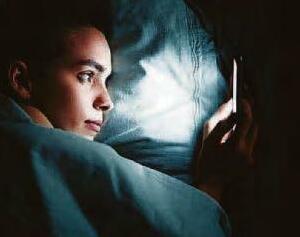Those having daily screen time immediately before they turn in for the evening were 33 per cent more prone to poor sleep quality.
They also tended to go to bed later than their peers, having 48 minutes' less sleep every week.
Researchers from the American Cancer Society said their findings show sleep disruptions linked to screens do not just affect children and teenagers.
They added: "Light exposure can disrupt sleep by disrupting this natural cycle through delaying the onset of melatonin. This can lead to reduced sleepiness and increased alertness.
"It is not only the light being emitted from these devices that needs to be considered, but the content as well."
The research team gathered data on sleeping habits and screen use...


